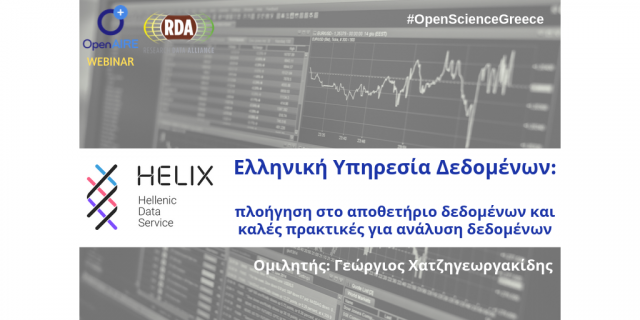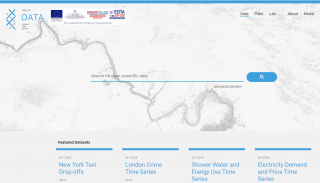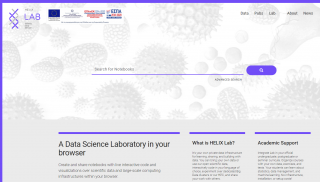A walk through the Hellenic Data Service “HELIX”
Putting into context: During the 2019 Open Access Week, the OpenAIRE Greek NOADs in collaboration with the RDA Greek Node organised a webinar on the Hellenic Data Service "HELIX". HELIX is a joint effort of Athena Research Center and GRNET aiming at supporting cross-disciplinary data-intensive research and promoting Data Science and Open Access policies. The webinar focused on informing Greek researchers and librarians about the national data repository (HELIX Data) and available tools for data analysis (HELIX Lab). Hence, it explained the use of HELIX Data as a service for accessing and sharing datasets and HELIX Lab as a service for discovering and running code. George Chatzigeorgakidis, research associate at Athena Research Center, went through the two services by giving real time examples using seismic data.
The national data repository: Starting with HELIX Data, George guided participants on how to use the platform, focusing on creating and/ or uploading (meta)data files. He stated that HELIX Data emphasizes on data quality which is evident during the curation process that takes place prior to publication of the data(sets). HELIX Data also supports data reusability by assigning open licenses to its artifacts. Additionally, data stored and preserved in the HELIX Data repository can be linked to lab notebooks that the HELIX Lab indexes. |
Data visualization made simple: Moving on, HELIX Lab was described as an open collection of apps and services which allows sharing and reuse of research data, interaction with code and experimentation with Big Data and HPC. An important feature of HELIX Lab is Jupyter Notebooks. Notebooks support coding in multiple programming languages, such as Python or R, for data(sets) visualization. George highlighted the value of Notebooks as learning tools, used by academics in postgraduate and undergraduate courses in Greek Universities. He also noted that HELIX Lab takes part in the OpenAIRE Citizen Science activity "Open Schools Journal for Open Science" that familiarizes students with the research and publication process. Through HELIX Data, Greek students have the opportunity to access and analyse seismic data collected by a network of school seismographs in Greece.
Planning ahead: The webinar ended with a Q&A session which, among other things, pointed out the areas where further tweaks are needed. HELIX is an infrastructure under development and many new features are expected to be introduced within the next weeks/ months. During the Q&A session, it was clarified that HELIX Lab can also be used for conducting statistical analysis.
Finally, George invited the participants to become HELIX users, so as to better explore its capabilities, and encouraged everyone to send their feedback or ideas on new functionalities that could be integrated by the HELIX services. Participants' requests for supporting material and hands - on activities, lead to a commitment by the organising committee to plan more events, such as interactive sessions at the second Symposium for Open Science in Greece (forthcoming).
Contact HELIX:
When you subscribe to the blog, we will send you an e-mail when there are new updates on the site so you wouldn't miss them.
About the author

funding from the European
Union's Horizon 2020 Research and
Innovation programme under Grant
Agreement No. 777541.




Comments